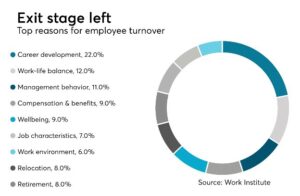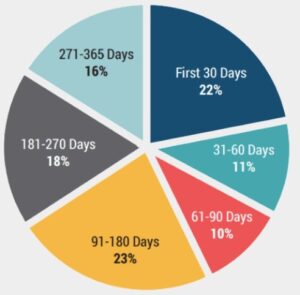Spoiler Alert – It’s Not Money
Keeping good employees is a challenge in almost every industry. A Society for Human Resources (SHRM) report found that on average, in a typical year, and in almost all industries, a company will experience an 18% turnover in its workforce, and the hospitality industry seems to be one of the hardest hit. In fact, according to the Bureau of Labor Statistics, the hospitality industry is one of the industries where turnover is currently rated highest in the nation.
To begin to stifle this exodus of employees, we first must understand why they are leaving. Many employers believe that one of the main reasons employees leave is for more money. Statistics show that is not the case. A ResearchGate study found that in the hospitality industry, there is a variety of variables that positively and negatively influence both voluntary and involuntary turnover that include employee motivation, accuracy of job information, relationship quality, job satisfaction, job demands, and emotional exhaustion.
Why Are You Leaving Me?
Uncovering why people leave their employer has been an ongoing study for years in an effort to curb costly turnovers. Some reasons employees leave are obvious such as moving out of state, seeking better benefits or simply no longer engaged in the work they are doing. If understood in advance, many of these can be countered by the employer; offering work-from-home programs, providing customized benefits, and finding ways to improve employee engagement. Others can baffle employers and leave them scratching their heads wondering how they can address the issues.
For example, a Harvard Business Review article found that, “Work anniversaries (whether of joining the company or of moving into one’s current role) are natural times for reflection, and job-hunting activity jumps by 6% and 9%, respectively, at those points. But other data reveals factors that have nothing directly to do with work. For instance, birthdays—particularly midlife milestones such as turning 40 or 50—can prompt employees to assess their careers and take action if they’re unhappy with the results. (Job hunting jumps 12% just before birthdays.)”
Industry Stats
Every year, Gecko Hospitality puts out their annual salary survey and in it are the top 10 reasons people leave their jobs in the hospitality industry. On average the survey includes between 1500-2400 candidates each year. What we’ve found is that it’s not about the money, at least not one of the top five reasons why people leave. It’s more about the culture of the business, the benefits the company provides, and just simple perks that lets the employee know they are recognized. In fact, our survey found that in the top 10 reasons for both male and female respondents, money didn’t even make the list.
It’s Not About the Money
It is a natural assumption to believe that the main reason employees quit is because of money. That’s not the case. Only 12% of workers leave a company because they want a raise or could earn more elsewhere. According to a survey of 2,285 US professionals, nine out of ten said they were willing to earn less money if it meant the work was more meaningful. For most people, work takes up a large majority of their time per day so if it is not fulfilling, it becomes drudgery. Meaningful work keeps employees engaged and not looking toward greener pastures, and therefore they are more productive.
As the graph below from Work Institute shows, the top three reasons people leave their employer is because of little opportunity for career development, not enough attention to work-life balance, and the conduct of managers.

Statistics from other sources reveal pretty much the same reasons. To decrease turnover in your company, there are three things you can do right now:
- Find Out Why They Are Leaving
All too often employers accept that there is turnover and move on to the process of hiring replacements. That doesn’t solve the issue. Although not every business has the luxury of investigating why people are leaving, it is critical that we make the time and resources available to conduct exit interviews and uncover why employees are leaving. The alternative is paying way too much in turnover costs and losing precious productivity.
And as you know, turnover can be very costly. All of the cost for searching, interviewing, hiring, onboarding and training simply goes out the window when an employee leaves. In fact, the Employee Benefit News found that employers spend around 33% of a worker’s annual salary during the replacement process. Based on the employee’s salary, that breaks down to:
- $12,000 to replace an entry-level employee making $36,000 a year.
- $20,000 to replace a manager making $60,000 a year.
- $50,000 to replace an executive making $150,000 a year.
Exit Interviews
To help reduce the high price of turnover, we should be investigating why employees are leaving. One way is to conduct exit interviews. Ray Dalio, in his New York Times best seller, Principles, states that losing a valued employee provides an important learning opportunity for organizations. Too often, though, we are so busy doing damage control that we fail to conduct a thorough investigation to help us understand what happened and what corrective action is needed to prevent similar episodes from occurring in the future.
When conducting exit interviews, you might not always get the true feelings or facts from your departing employees. In fact, there is research suggesting that a large percentage of employees are not very candid during their exit interview. However, at least in the hospitality industry where there is greater turnover, consistent interviews over time should produce useful information of a trend or at least of things you can tweak in order to keep employees longer.
- See If Your Employees Are Engaged
Many employees leave because they are unhappy with the company culture, dissatisfied with career development or work-life balance. To help solve this, we need to find out if employees are engaged (or not) in their current job. If not, take steps to make things better for them.
But how do you gauge the engagement of your workforce? One fast and easy way is to simply survey your employees. It doesn’t have to be a long survey, but one that it is inviting for the employee to fill out. A recent SHRM article explains the best way to create a employee engagement survey. To summarize, the survey should include the following:
- Preparation – Communicate the reason for the survey first, then ensure the questions are relevant and understandable.
- Privacy – Use an outside source to provide you with anonymous feedback.
- Development – Keep the survey short and to the point. Allow employees to add additional information if they choose to.
- Metrics – Send reminders to employees to complete the survey. Reinforce that the surveys are anonymous and conducted by a third party. Review the response rates based on job categories.
- Results and Feedback – Be transparent and honest sharing the results with employees. Communicate what action will be taken going forward based on the survey results.
Be sure to focus on your leaders and managers in the engagement survey as well. According to a Gallup poll, managers account for 70% of the variance when it comes to employee engagement scores. But unfortunately, managers themselves suffer from high levels of burnout and low engagement levels. This same survey found that the drop in engagement for managers was steepest.
- Examine Onboarding Processes
In the fast-paced hospitality environment, there is little time to do everything perfect. But there is time to do the important things right the first time. Onboarding is one of those things that if done right, makes a powerful impact on reducing turnover. Onboarding provides the orientation needed to give a new hire an idea of how the company works. It familiarizes the new hire with the processes they will be responsible for and the culture they will be working in.
Proper onboarding should not be a one week or one month process. It should be at least one year with continuous communication with the new hire. Making sure they understand their role as well as soliciting any questions or concerns they may have is very important. Onboarding is your opportunity to make sure they are engaged in their job. If they are not, find a position they are more suited for. The graph below shows the percentage of employees who leave within a specific time period. A continual on-purpose onboarding process will ensure that your employees remain with you for a longer period of time.

(From: leftronic.com)
Most experts agree that retention efforts should start on day one. This makes the onboarding process crucial to retention success. It also provides an insight into whether this employee will fit in or not.
Keep Them Longer
Understanding why employees leave is a great start into fixing turnover issues. Getting a handle onto why you are losing employees will help you to begin understanding the things you can change. You can keep good employees longer if you can find out what keeps them engaged and happy in their work. By discovering the trigger points that cause them to leave, you can make an impact on future hires by tweaking, improving, or removing those triggers.

